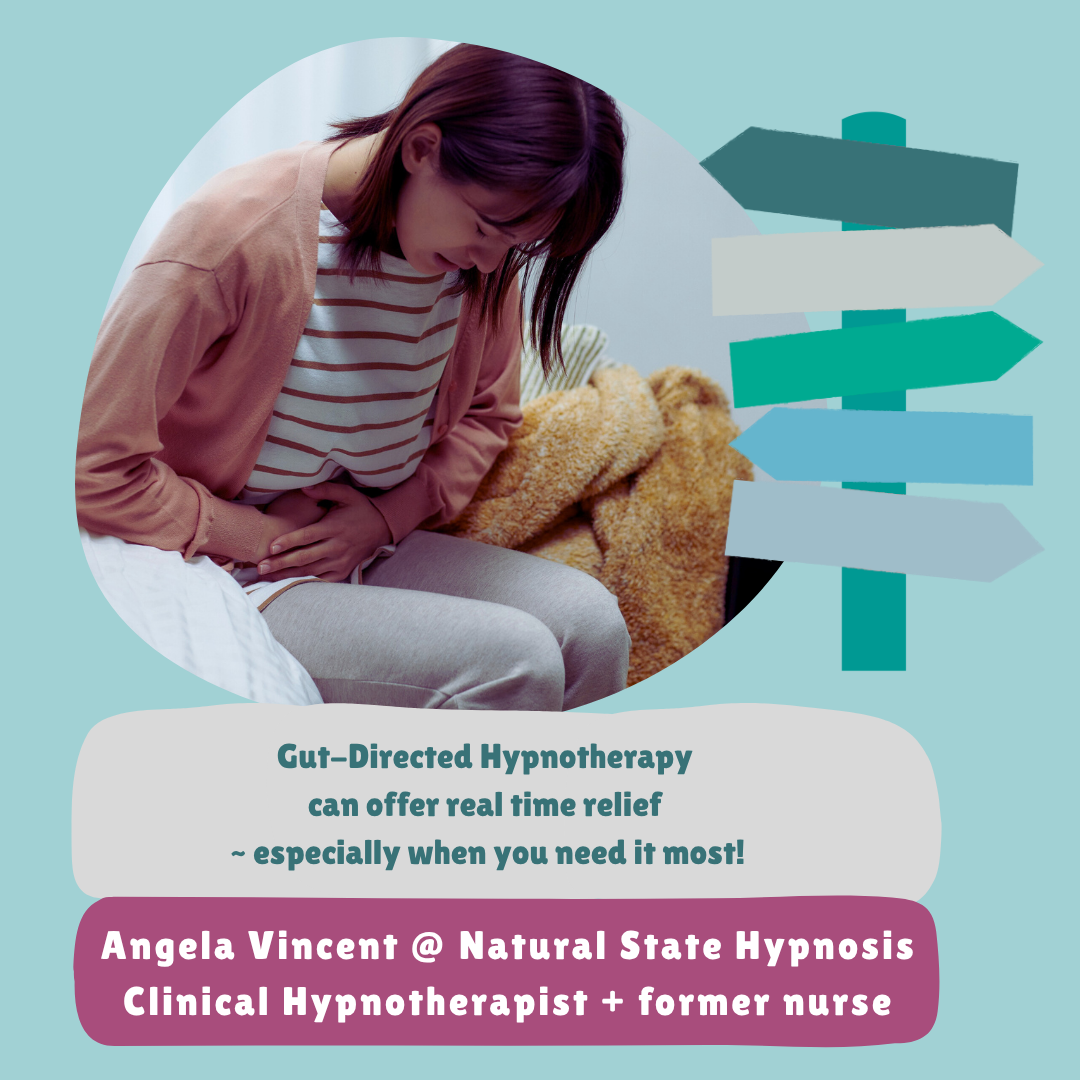Gut-Directed Hypnotherapy
A Mind-Body Approach to Digestive Healing
Gut-Directed Hypnotherapy (GDH) is a targeted psychological intervention designed to soothe the nervous system, recalibrate digestive function and improve quality of life for those living with gastrointestinal conditions. Rooted in the gut-brain axis model, this therapy works by tapping into the subconscious patterns that influence visceral sensitivity, motility and stress response providing relief where conventional firstline therapies have not provided therapeutic symptom relief.
What Is Gut-Directed Hypnotherapy?
GDH uses gentle hypnotic suggestion to interact with the enteric nervous system, the ‘second brain’ nestled within the digestive tract. It helps down-regulate gut hypervigilance, reduce symptom flares and restore a more natural rhythm to digestion. Sessions may include metaphors of healing, clinical hypnosis supporting improved digestive function and language that soothes both the body and mind.
GDH does not erase symptoms in a single sitting, nor does it override the need for medical care. Instead, it strengthens resilience, lowers gut-focused anxiety and rewires how the brain interprets digestive discomfort.
How GDH Works
Gut-Directed Hypnotherapy for Irritable Bowel Syndrome (IBS) utilises a structured, evidence-based approach that focuses on the brain-gut axis to alleviate symptoms and improve quality of life. The process typically unfolds over several weekly sessions, either in person or online, tailored to individual needs.
Initially, a detailed assessment is conducted to understand your specific IBS symptoms, triggers and medical history. As a medically-attuned Clinical Hypnotherapist, Angela integrates this information with her knowledge of the mind-body connection.
During the sessions, guided hypnosis techniques are employed to induce a deeply relaxed state, allowing access to subconscious processes that influence gut function. Specific suggestions and visualisations target the regulation of gut motility, sensitivity and immune responses, reducing pain, bloating and bowel irregularities.
Throughout therapy, you are trained in self-hypnosis and relaxation strategies, empowering you to manage symptoms independently between sessions. The treatment plan often incorporates education on gut health, stress management, and lifestyle adjustments to support lasting benefits.
By addressing both psychological and physiological factors, Gut-Directed Hypnotherapy facilitates a calming effect on the enteric nervous system, promoting a balanced and more resilient digestive system. Regular reviews monitor progress and adapt strategies to ensure sustained relief from IBS symptoms. It uses metaphors and guided imagery to calm the brain-gut axis, Improving gut motility, reducing visceral hypersensitivity and lowering stress and anxiety.
Clinical Implications
GDH is now recommended as a primary or adjunct therapy for IBS
Especially valuable for patients who don’t respond to diet or medication
Monash continues to explore GDH’s role in Inflammatory Bowel Disease (IBD)
What Does the Evidence Say?
The clinical data supporting GDH is compelling:
A landmark study by Whorwell et al. (1984) found significant improvements in IBS patients up to 70% showing long-term symptom reduction.
Systematic reviews (Ford et al., 2014) have confirmed that GDH outperforms standard care in reducing IBS pain, bloating, and bowel dysfunction.
A 2020 systematic review in Gut found Gut-Directed Hypnotherapy to be one of the most effective psychological treatments for IBS, with strong outcomes across 41 randomized trials involving over 4,000 participants.
MRI research even suggests hypnotherapy can affect brain regions linked to pain modulation and emotion regulation.
Monash Research Highlights on Gut-Directed Hypnotherapy
🔬 Clinical Effectiveness
Monash studies show 70–80% of IBS patients experience long-term symptom relief with GDH.
GDH was found to be as effective as the low FODMAP diet, offering an alternative for those who struggle with dietary restrictions.
Improvements include reduced abdominal pain, bloating, diarrhoea, constipation, and psychological distress.
A 2015 peer-reviewed article in Alimentary Pharmacology & Therapeutics by Peters, Muir, and Gibson reviewed GDH’s mechanisms and efficacy.
It found durable symptom reduction in 6 of 7 randomized trials, with response rates between 24% and 73%.
GDH also showed promise in maintaining remission in ulcerative colitis patients.
📱 Digital Delivery via Nerva App
Monash collaborated on the Nerva app, delivering GDH digitally to over 200,000 users.
A randomized controlled trial showed:
71% had reduced abdominal pain
81% improved symptom severity
37.5% reported reduced anxiety
Endorsed by Australian Prescriber: a holistic, empathetic approach to IBS management, noting that GDH can help regulate the brain-gut axis and reduce symptom severity, especially when dietary or pharmacological interventions fall short.
GDH is now endorsed by organisations such as The American College of Gastroenterology and The UK National Institute for Health and Care Excellence (NICE) as a non-invasive adjunct therapy for functional GI disorders.
Angela Vincent’s Medically-Attuned Approach
As both a former oncology nurse and Clinical Hypnotherapist, I bring together medical insight and psychological support. My GDH practice is grounded in evidence but infused with empathy. Clients can expect:
A therapeutic space that honours both physical symptoms and emotional experiences
Personalised hypnotherapy based on the client’s medical history, symptom triggers and subconscious beliefs
Visualisation tools designed to strengthen gut comfort, agency and trust
Gentle rmicro-habits to build confidence, reduce embarrassment and shame, restore calm and invite recovery
This isn’t generic hypnosis, it’s hypnotherapy informed by neuroscience and clinical care, delivered with compassion and clarity.
What to Expect
GDH sessions typically unfold over 6–10 weeks. Clients rest comfortably while guided through calm, focused state of hypnosis that speaks directly to the digestive system. Between sessions, you have access to your Hypnosis MP3 recording to encourage ongoing support and lifestyle micro-tweaks to reinforce healing.
Clients often report:
Reduced urgency and bloating
Fewer flare-ups linked to stress or food
Improved sleep, self-trust and symptom tolerance
Gut-Directed Hypnotherapy is not a magic cure, it’s a return to rhythm.
For those ready to recalibrate their body’s inner conversation, the gut may finally feel heard.
Bookings
Angela is based in Hobart, Tasmania and provides TeleHealth outside of her region. Send an enquiry or simply book your initial session in today!

